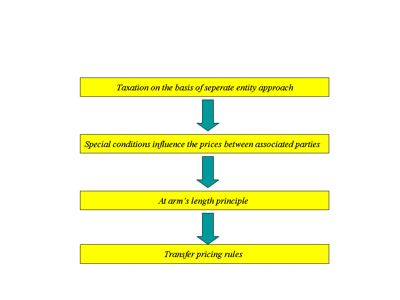Basic principles of transfer pricing in The Netherlands
The cornerstone of the Dutch transfer pricing rules is that in essence every entity is considered a separate independent tax payer and that transactions with related parties should be filtered of non-businesslike influences (separate entity approach).
The basic principle is that each entity should receive a remuneration that is a reflection of the functions performed, taking into account the assets used and the risks assumed (functional analysis). It must act towards related parties as it would act towards unrelated parties under comparable circumstances (the at arm’s length principle).

The Netherlands have extensive policy with regard to the topic of transfer pricing. There is also legislation, but this only covers the basic principles. In essence, the OECD Guidelines for transfer pricing form the basis for the Dutch transfer pricing policies and legislation, albeit the Netherlands refrains the right to deviate from the OECD Transfer Pricing rules and in fact it has done so on various points.
The basic Dutch principles of transfer pricing can be summarized as follows:
- The profit of a Dutch company must be determined as if the Dutch company where a fully independent party, thus ignoring shareholder’s influences (at arm’s length principle). This rule applies to Dutch corporations, but also to Dutch branches of foreign corporations.
- If the profits of a Dutch company are considered too high or too low, the statutory (accounting) profits will have to be adjusted to determine the profit for tax purposes. This will ussually result in permanent differences between the entity's commercial/ statutory profits and fiscal profits.
- Profit adjustments may go upward, which then in most cases technically constitute a deemed dividend, or they can go downward, which in most cases technically constitute a deemed capital contribution.
- Although the primary impact of a profit adjustment is the corporate tax charge, there are secondary exposures in the area of Dutch dividend withholding tax (deemed dividends - see above) or Dutch income tax (in case of individual Dutch shareholders).
- The profit adjustments can be applied by the tax payer voluntarily and reported to the tax authorities in (supplementary) corporate income tax returns. The tax authorities may however also force profits adjustments upon the tax payer by levying assessments which deviate from tax returns filed.
- It is generally possible to obtain certainty in advance from the Dutch tax authorities on transfer pricing issues through advance tax rulings, so-called Advance Pricing Agreements.
What we can for you:
We are gladly prepared to assist you with transfer pricing issues and the associated documentation and filing requirements.
If you wish to receive more information, please feel free to contact us via e-mail or call us at our office in Amsterdam +31 (0)20 5709440 or Rotterdam +31 (0)10 2010466.
We will make time for you!
Back to Index - Transfer pricing in The Netherlands
Next - Profit adjustments arising from transfer pricing discussions

